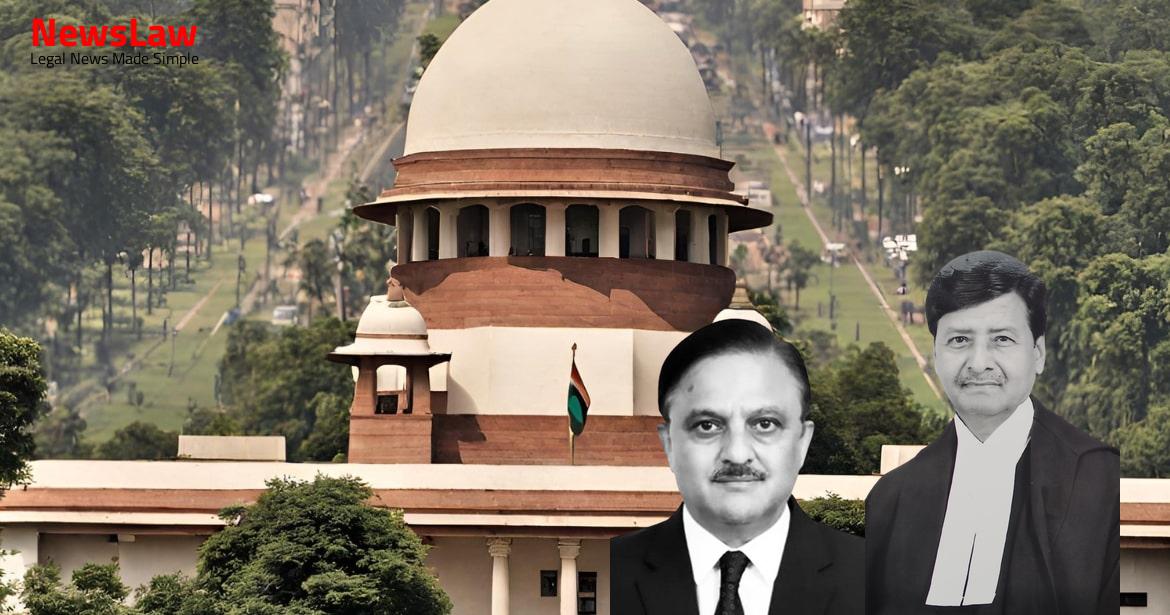Explore the importance of interpreting statutes for effective judicial remedies in the realm of consumer protection and real estate regulations. This summary delves into the court’s analysis of the harmonious reading of the Consumer Protection Act and the RERA Act to ensure transparency, standardization, and consumer rights in the real estate sector. Stay informed about the court’s focus on access to justice and the need for regulation in the historical context of consumer protection. #LegalAnalysis #ConsumerRights #RealEstateRegulations
Facts
- The Consumer approached the National Disputes Redressal Commission with a complaint regarding non-possession of the apartment despite payment of Rs. 2,06,41,379.
- The Consumer sought a refund of the entire amount paid along with interest at 24% per annum.
- The appeals under Section 23 of the Consumer Protection Act, 1986 were filed against the judgment passed by the National Consumer Disputes Redressal Commission.
- The Commission directed the Developer to refund Rs. 2,06,41,379 to the Consumer with interest at 9% per annum for its failure to deliver possession of the apartment as per the agreement.
- The Developer admitted that the trigger date for clause 10.1 was the date of execution of the apartment buyer’s agreement.
- The Consumer booked a 3525 sq. ft. apartment in Windchants for Rs. 2,36,15,726 with a construction linked payment plan.
- The Commission directed the Developer to refund Rs. 2,36,15,726 with interest as per Pioneer Urban Land and Infrastructure Ltd. v. Govind Raghvan.
- The Developer claimed justification for delay citing obtaining of Occupation Certificate and application for Phase-2 OC.
- The Commission found that the Developer was in violation of clauses related to project completion, possession, and delay compensation.
- The Commission’s judgment allowed the Consumer’s complaint and ordered the refund under Section 14 of the Act.
- The Act and RERA Act are to be read harmoniously for their common purpose, as they do not exclude or contradict each other.
Also Read: Balancing Power and Transparency: Electoral Bonds Struck Down, Disclosure Mandated
Arguments
- The Respondent argues that the terms of the Apartment Buyer’s Agreement alone should govern the relations between the parties, excluding the application of the RERA Act.
- He contests the rate of interest granted by the Commission as too low, seeking an enhancement to 24% p.a. as petitioned before the Commission.
- Issues arising for consideration include whether the Apartment Buyers Agreement terms constitute an ‘unfair trade practice’, the Commission’s power to direct a refund with interest, and potential modifications to the relief granted for the sake of justice.
- The Respondent discusses clauses 10.1 and 13.1 of the Apartment Buyers Agreement regarding project completion period and delay compensation, highlighting potential consumer benefits from taking possession despite delays.
- Referring to the RERA Act and its regulations, the Respondent argues that the Consumer’s choice to proceed under the Consumer Protection Act excludes the application of the RERA Act and limits reliance on precedents such as Pioneer Urban Land and Infrastructure Ltd. v. Govindan Raghvan (2019) 5 SCC 725.
- In contrast, the Consumer’s counsel supports the Commission’s decision and refers to the Pioneer judgment in favor of the Consumer’s claims.
- Both parties have filed appeals, with the Developer challenging the interest rate decision and the Consumer seeking an enhancement to 24% p.a.
- The Developer asserts that the Pioneer judgment does not apply to the present case due to the distinct Delay Compensation Clause’s presence.
Also Read: Recall of Resolution Plan Approval: Legal Analysis
Analysis
- The court emphasized the importance of interpreting statutes to create effective judicial remedies in line with the notion of access to justice.
- The judgment highlighted the need for regulation and standardization in the real estate sector due to historical lack of professionalism and consumer protection.
- It discussed the provisions of Section 18 of the RERA Act, emphasizing that the remedies provided are additional and not exclusive, allowing for alternative remedies under different statutes.
- The court clarified that a consumer can choose the relief they seek, and the courts must respect and honor this choice.
- It mentioned the establishment of the Real Estate Regulatory Authority for regulation and promotion of the real estate sector, ensuring transparency and consumer protection.
- The judgment referenced previous cases where one-sided contractual terms in builder-buyer agreements were deemed unfair and unreasonable, necessitating legislative intervention like the Real Estate (Regulation and Development) Bill, 2013.
- The District Forum, after conducting proceedings under section 13, can issue an order directing the opposite party to take certain actions if the goods or services are found to be defective.
- Similar to Section 18 of the RERA Act, the District Forum can order the opposite party to return the price or charges paid by the complainant, along with additional compensation if a large number of consumers have suffered loss.
- The Consumer prayed for interest and compensation, and the Commission ordered the Developer to refund a specific amount along with interest.
- If the Company fails to offer possession of the Apartment to the Buyer by the end of the Grace Period, the Company shall be liable to the Buyer for return of the amount with interest and compensation.
- The Buyer agrees to a Grace Period of 180 days after the Commitment Period for unforeseen and unplanned Project realities.
- The Developer cannot enforce one-sided contractual terms on apartment buyers.
- Consumer can seek refund and interest if possession of the flat is delayed.
- Terms in Apartment Buyer’s Agreements found to be oppressive and unfair trade practices.
- Consumer Courts have jurisdiction to direct refund and compensation for deficiency of service.
- Consumer Protection Act allows for refund of charges paid if allegations are proved.
- Incorporating one-sided clauses in agreements is deemed as unfair trade practice.
- Consumers have parallel remedies under the Consumer Protection Act, RERA Act, and Insolvency and Bankruptcy Code.
- Consumer Forums empowered to declare unfair terms in agreements and award compensation.
- Consumer can terminate agreement and seek refund if possession is delayed indefinitely.
- Commission has powers to direct refund of charges paid by consumers.
- The interest of 9 per cent granted by the Commission is considered fair and just.
- There is no reason to interfere in the appeal for enhancement of interest made by the Consumer.
- The Commission has correctly exercised its power and jurisdiction in directing the refund of the amount with interest.
Decision
- The Civil Appeal No 6044 of 2019 filed by the Appellant Developer is dismissed.
- The appeal filed by the Consumer as Civil Appeal No.7149 of 2019 is allowed in part.
- The Appellant-Developer deposited Rs. 50,000/- in the registry of the Court as per Section 23 of the Act.
- A sum of Rs. 11,00,000 paid on 9th June 2012, and the balance shall be made over to the Respondent-Consumer.
- The interest on the funds shall be payable from the dates of deposit.
- The Opposite Party is directed to refund the amount of Rs. 2,06,41,379/- paid by the Complainant along with interest @ 24 % p.a.
- The Complainant is awarded future and pendentelite interest at the same rate.
- The interest on the refund shall also be payable from the dates of deposit.
- The Opposite Party is held guilty of unfair and restrictive trade practices and deficiency in service.
- The Complainant is considered as partly allowed in the appeal.
- Cost of the complaint is to be paid by the Opposite Party.
Case Title: EXPERION DEVELOPERS PRIVATE LTD. Vs. SUSHMA ASHOK SHIROOR (2022 INSC 404)
Case Number: C.A. No.-006044 / 2019



